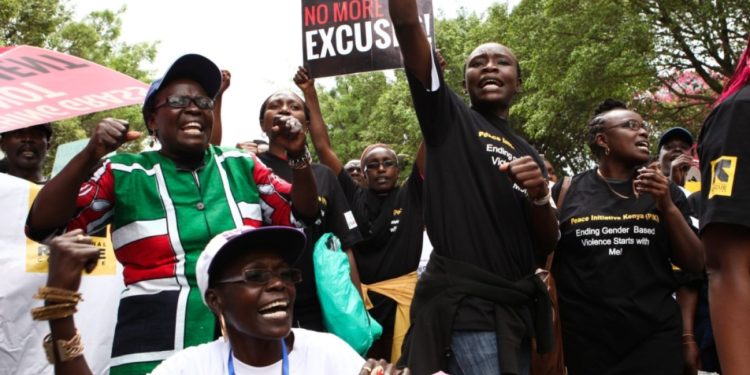By AL JAZEERA
The murders of two Kenyan women this month are spotlighting a worrying regularity in gender-based violence in the East African country, with activists calling for more government measures to protect women.
Rita Waeni, a 20-year-old student was killed and dismembered in a shortlet apartment in the capital Nairobi on January 14. Days before, a popular Instagram figure, Starlet Wahu, 26, was found dead in an Airbnb room, bleeding out from a fatal stab wound inflicted by a man she met online.
They are only two of at least four reported gender-based murders in Kenya since the start of the year, as the country faces an increasing number of killings and abuses meted on women, rights groups say.
Amid social media outrage, women say they plan to assemble in protest on January 27 to demand more action from authorities.
Here’s what happened in the recent cases, an overview of gender-based violence, and what activists are demanding:
What do we know about the recent murders?
CCTV footage captured Starlet Wahu, a social media influencer, walking with a male figure into a shortlet in a mid-class neighbourhood in Nairobi on the evening of January 3. The man left the premises the next morning with bloodied clothes and a possible leg injury, a guard told the police. Wahu was found lifeless, with stab wounds and bite marks. Police found HIV test kits and a bloodied knife in the room. A suspect, believed to be a serial offender, has been arrested. Several women have stepped up to accuse the same man of previous assaults.
Nearly two weeks later, on January 14, the dismembered body of Rita Waeni, a fourth-year student of Nairobi’s agriculture university, was found in a bag dumped at a trash collection point in the central business district.
Waeni had also entered a short-term rental with a man the day before, but eyewitnesses say only the man left the room, and that blood traces led them to the bag. Waeni’s family members said they received texts for a ransom, possibly after her murder. Local papers report that Waeni may have been lured by her murderer through the social app, Instagram. Three male suspects are in custody – one was arrested at the airport on his way out of Kenya.
Kenyan media have also reported the murders of two other women in the last week. Police say Christine Aume was cooking in her detached kitchen in Homa Bay, western Kenya, when she was attacked and beheaded on January 17. On the same day, police found a woman murdered and dumped by a road in Kiambu County, central Kenya.
How many women have been murdered?
Activists in Kenya say the country is experiencing increasing rates of femicide, which is defined as the intentional murder of women or girls primarily because of their gender, and usually by their partners or other persons they know like family members.
The Kenyan government doesn’t collect figures on women murders. However, Femicide Count Kenya, which monitors killings reported in local news, recorded 58 deaths it labelled as femicides between January and October 2022. In 2023, the organisation said it recorded at least 152 killings – the highest in the past five years.
Some 500 Kenyan women were murdered between 2017 and 2024, according to another estimate by investigative platforms Africa Uncensored and Africa Data Hub.
2 weeks into 2024, headlines tell of women killed by men close to them. The cases only scratch the surface, countless deaths go unrecognized.
This Friday, with @AfUncensored & @Africa_DataHub, we launch “#SilencingWomen“: a database of femicide cases since 2016. #EndFemicideKE pic.twitter.com/kalubrYM0t
— VybeCast (@VybeCast) January 16, 2024
Abuse cases are rife. News reports document women being beaten, stabbed and raped. Nonprofit Usikimye, which runs a helpline for female survivors of violence, says it receives more than 150 calls daily, including from people who refer to a third party suffering abuse.
A 2022 national survey also found that about a third of Kenyan females – some nine million women – have experienced some form of physical violence.
Although many of the deaths occurred in private spaces, women in Nairobi say there’s a general atmosphere of fear in the city, and that they are finding safety in measures like travelling in groups because they have little faith in the authorities.
“We as Kenyan women are not being listened to,” said Inyika Odero, an activist and model who helped organise a virtual protest and discussion on Sunday after authorities refused her a protest permit.
“What else can we do apart from travel in groups and try to get home before it’s dark which is almost impossible because people have jobs and take public transportation?” Odero said. “We are not allowed to have tasers or pepper spray, that’s illegal.”
Why is femicide on the rise?
Kenya, like many African countries, has adopted treaties that address gender-based violence, including the UN Convention on the Elimination of All Forms of Discrimination against Women (CEDAW) and the African Charter on Human and Peoples’ Rights.
National laws like the Sexual Offences Act also criminalise violence against women. In addition, the Kenyan police have a specialised gender desk. But activists say government policies are scarcely effective.
“We have seen no government-sponsored national campaigns addressing GBV [gender-based violence] or its consequences,” said Shyleen Bonareri, director of Nairobi-based Young Women’s Leadership Institute (YWLI).
“The justice system remains sluggish and ineffective in prosecuting the perpetrators and corruption continues to cause gaps in the implementation of these ambitious laws,” she told Al Jazeera.
Instead, many women say, there’s a deep-seated “misogynistic” culture that sees women as objects to be “owned” and that focuses on shaming them for being victims, rather than their male perpetrators.
Even as shock and outrage grew over the killings of Wahu and Waeni on social media, activists point out how some Kenyans, notably men, have chosen to blame the women, questioning everything from why they were meeting up and entering shortlets with the men.
Idk if the media was careless in reporting femicide before but there’s been horrifyingly too many cases of women decapitated and butchered in their own homes and other places this week alone. We can’t wake up to the news of another woman chopped up into pieces #EndFemicideKE NOW pic.twitter.com/T7qgxJPhy6
— A (@aishxhbg) January 18, 2024
“It is commonplace for a Kenyan woman to be ‘disciplined’ by her husband, with some people even seeing this as a sign of affection where a man is taking the time to ‘teach’ his wife,” Bonareri added. “Patriarchal ideas such as these coupled with the structural inequalities between men and women in the Kenyan society leave a breeding ground for violence to take place.”
What do women’s groups want now?
Many in Kenya are following the ongoing investigations into the murders of Wahu and Waeni. Officials say they are still trying to find suspects in the other two murders reported this week.
Kenya is going through a national “crisis” rights groups say. It’s why women are mobilising for demonstrations later in January, using the hashtags #EndFemicideKE, #StopKillingUs and #TotalShutdownKE.
Some like Momanyi say there hasn’t been an effective response from President William Ruto’s administration to the issue, and add that his government is “insensitive”.
Harriet Chiggai, the president’s advisor, has condemned the recent femicide cases and assured that the government was taking measures to tackle the issue.
“Let me reiterate that the government in its women’s agenda is explicitly committed to ending all forms of violence,” Chiggai said at a news conference in Nairobi on January 19.
Activists are demanding that femicide be distinctly recognised as a crime and for perpetrators to receive heavier sentences. They also want the government to collect data on women, and for health and law officers to be trained so they can proactively identify and protect vulnerable people.
This year’s deaths are reminiscent of the shocking murders of two elite athletes in October 2021 and April 2022.
Long-distance runners Agnes Tirop and Damaris Mutua were both murdered in their homes in the idyllic, mountaintop town of Iten, six months apart.
Tirop had just become the world’s fastest runner of a 10km women-only road race in Germany, and Mutua, an Olympian, had just placed fourth in another race in Angola. Police suspect both were murdered by men they knew, with Tirop’s husband now on trial for her murder.







Discussion about this post